BICT Fest 2021: International Webinar
Rethinking Theatre and Education for the New Chapter
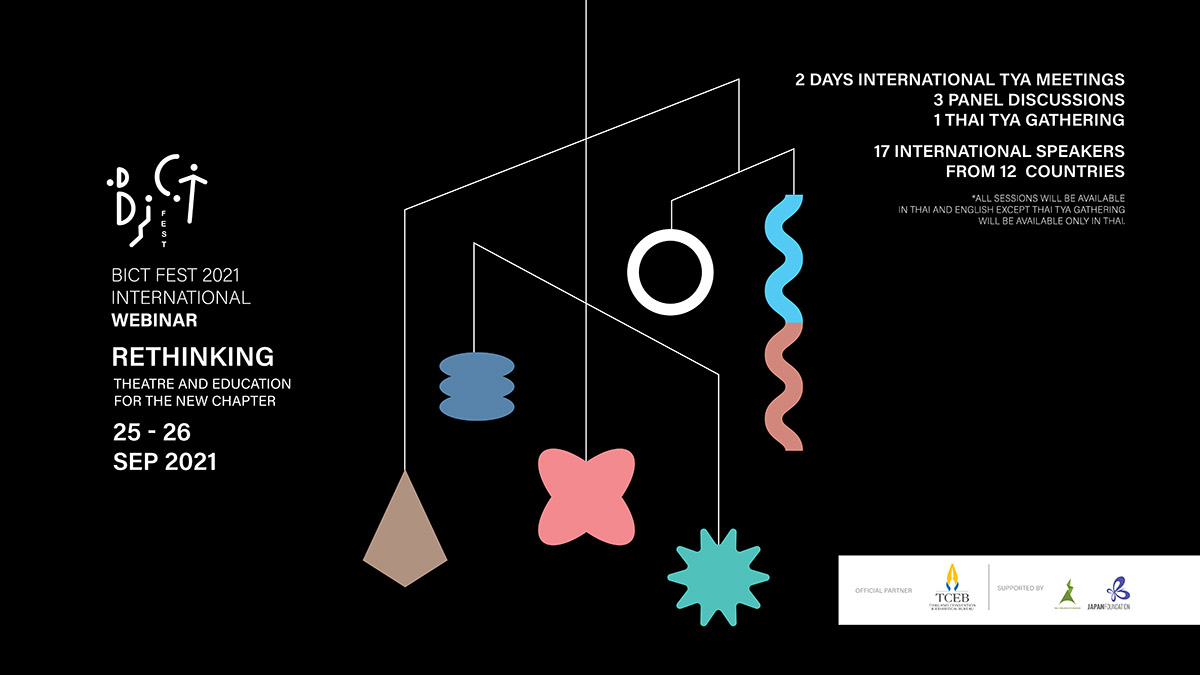
สถานการณ์โรคระบาดโควิด 19 นับเป็นตัวกระตุ้นสำคัญที่ทำให้เกิดการเปลี่ยนแปลงในการใช้ชีวิต การเรียนรู้ และการเล่นของเด็กๆ ทั้งยังส่งผลต่อเนื่องในระยะยาว ในขณะที่ภาคการศึกษาทั่วโลกต้องเปลี่ยนมาใช้แพลตฟอร์มออนไลน์ และเปลี่ยนแปลงรูปแบบการเรียนการสอนให้เข้ากับพื้นที่ใหม่นี้ ศิลปะการแสดงเองก็ต้องพัฒนาเพื่อตอบสนองกับโลกที่เปลี่ยนไปเช่นกัน ตั้งแต่การนำแพลตฟอร์มออนไลน์ต่างๆ มาใช้ ไปจนถึงในการเผยแพร่การแสดงสดจากในบ้านของศิลปิน ปรากฏการณ์เหล่านี้ได้ทำให้ความหมายของการเรียนรู้ การมีส่วนร่วม และ การเชื่อมโยงทางสังคมเปลี่ยนแปลงไป และยังก่อให้เกิดความกังวลเกี่ยวกับความเหลื่อมล้ำในการเข้าถึงของเด็กๆ บางกลุ่ม ทำให้ทั้งนักการละครและนักการศึกษาพยายามศึกษาและบูรณาการองค์ความรู้ต่างๆ เพื่อหาวิธีเชื่อมโยงการเรียนรู้กับกลุ่มเป้าหมายทั้งในด้านศิลปะ สังคม และวัฒนธรรม ทั้งยังมีการสนทนาถึงความเป็นไปได้ของการศึกษาอย่างกว้างขวาง
การเสวนาออนไลน์ของ BICT Fest ในปีนี้ จึงมุ่งประเด็นไปที่ความสัมพันธ์ของการละครและการศึกษาในบริบทของประเทศต่างๆ ทั่วโลก เรื่องบทบาทของโรงเรียนและการละครในการส่งเสริมพัฒนาการและการเรียนรู้ของเด็กในสภาวะการณ์ปัจจุบัน เราได้เชิญผู้เชี่ยวชาญหลากหลายภาคส่วน ทั้งผู้สร้างงาน ศิลปิน ผู้กำหนดนโยบาย นักการศึกษา และผู้ที่มีความสนใจการทำงานละครเพื่อ/โดย/ร่วมกับเด็กๆ มาสนทนาเพื่อสำรวจความเป็นไปได้ใหม่ๆ และ หาวิธีทำให้การบูรณาการนี้สามารถส่งเสริมการทำงานของโรงเรียน ศิลปิน และ เครือข่ายชุมชน ให้มีวิธีการและกลยุทธ์ที่สร้างสรรค์ สร้างการมีส่วนร่วม และมีความยั่งยืนได้มากขึ้น BICT Fest หวังว่าการสนทนานี้จะสร้างแรงบันดาลใจ ให้ผู้ฟังได้ไตร่ตรองว่าการเรียนรู้แบบใดที่เราคาดหวังและจำเป็นสำหรับเด็กๆ ในรุ่นถัดไป
The Covid-19 pandemic has been a catalyst for accelerated change and will continue to transform the way children live, play and learn. Just as education sectors around the world have turned to digital platforms and blended forms of learning, theatre practices have also responded to the changing world. From harnessing new technological platforms to streaming performances from the living room, these activities are reconfiguring children’s learning, participation and social engagement. This shift, however, has also raised concerns of inequalities of access. Despite the challenges the pandemic has brought about, theatre practitioners and educationalists are continuing to work together in ways that are artistically, socially and culturally engaged and inventive, placing theatre’s creative and educative potential at the heart of many debates.
This year’s webinar focuses on the relationship between theatre and education in a range of global contexts. It seeks to understand where schools are at and the role theatre has in furthering children’s creative learning and development. We invite producers, practitioners, policymakers, educators and anyone interested in theatre for/by/with children to join the conversation as we explore and imagine how this intersection can continue to encourage practices and strategies for schools, artists and community-based allies that are innovative, inclusive and sustainable. We hope these conversations will inspire you to rethink the kind of learning we want and need for the future generations moving forward.
หัวข้อที่ 1 การละครและการศึกษาผ่านกิจกรรมสร้างสรรค์ในอาเซียน: กรณีศึกษาจากประเทศกัมพูชา เมียนมา และไทย
Topic 1 – Snapshots of Theatre and Creative Education in Southeast Asia: Cambodia, Myanmar and Thailand
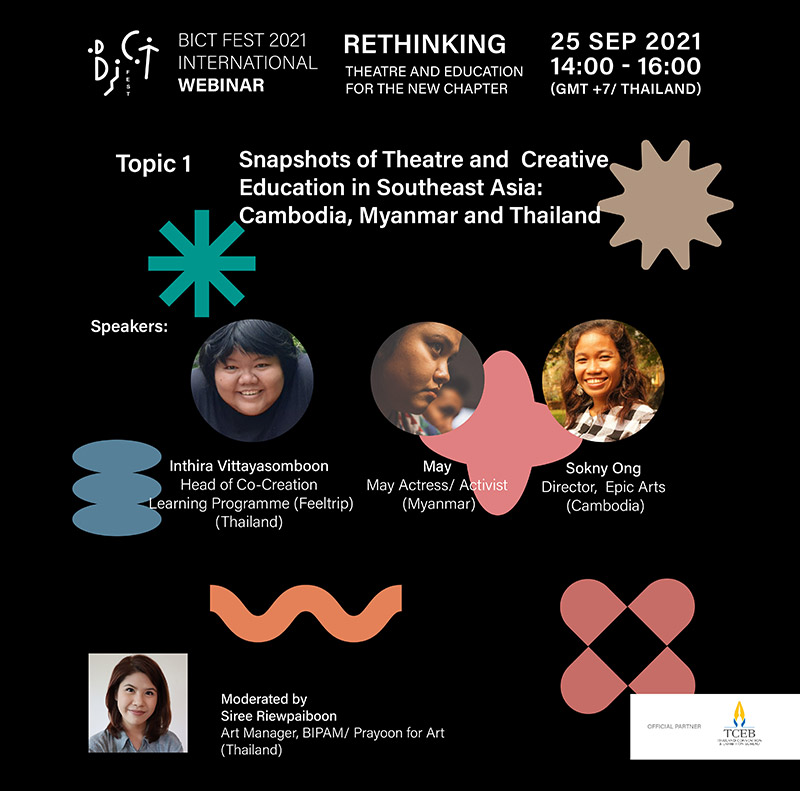
ในปัจจุบัน หลายๆ ประเทศในภูมิภาคเอเชียตะวันออกเฉียงใต้ ยังคงประสบปัญหาความเหลื่อมล้ำทางด้านเศรษฐกิจ สังคม และความไม่มีเสถียรภาพทางการเมือง ที่ส่งผลไปถึงความเหลื่อมล้ำในการเข้าถึงการศึกษาที่มีคุณภาพของเด็ก อีกทั้งรัฐบาลกลางในหลายๆ ประเทศ ก็ไม่เห็นความสำคัญของการสนับสนุนศิลปะ และได้ลดบทบาทของกิจกรรมสร้างสรรค์ และ การละครที่ที่เคยมีในโรงเรียนลง
แต่ในความเป็นจริงแล้ว ในภูมิภาคนี้ มีศิลปินและนักกิจกรรมที่ใช้งานศิลปะเพื่อทำงานกับเด็กและชุมชนมาเป็นเวลานาน แสดงให้เห็นว่าการละครเพื่อการศึกษาหรือศิลปะแบบเน้นการมีส่วนร่วมก็ได้ถูกพัฒนาไปไกลกว่าจุดมุ่งหมายทางสุนทรียภาพ แต่ยังเป็นการสร้างสรรค์เพื่อพัฒนาชุมชน การสนทนาในหัวข้อนี้จึงมุ่งประเด็นไปที่การให้วิทยากรแบ่งปันประเด็นปัญหา และ โอกาสจากการทำงานด้านการละครและกิจกรรมสร้างสรรค์เพื่อการศึกษาในบริบทประเทศของตนเอง และพูดถึงบทบาทและคุณค่าของการละครและศิลปะต่อสังคม รวมถึงวิธีการที่ศิลปินในภูมิภาคนี้ใช้เพื่อนำศิลปะและการละครไปใช้ และ วิธีการสร้างโอกาสที่เท่าเทียมระหว่างเด็กๆ ในโรงเรียนรัฐและโรงเรียนเอกชน
In many Southeast Asian countries, where social and economical inequality, and political instability are still the underlying issues, affecting, as a result, unequal distribution of high quality education for all children. Educational theatre and engaged arts have developed and progressed beyond artistic creation to serve as community development. However, the lack of government support for the arts has led to a decline in theatre and creative activities in schools over the last two decades. In this session, the panel will discuss some of the challenges and opportunities that accompany theatre and creative learning in education in their respective context. What is the role and value of theatre and art in these societies? How do artists in these regions navigate theatre’s and aesthetics and instrumental dimensions? How, and in what ways, can we encourage equitable opportunities for children across public and private schools?
หัวข้อที่ 2 การเรียนรู้อย่างสร้างสรรค์ในมุมมองระดับสากล
Topic 2 – Global Perspectives on Creative Learning
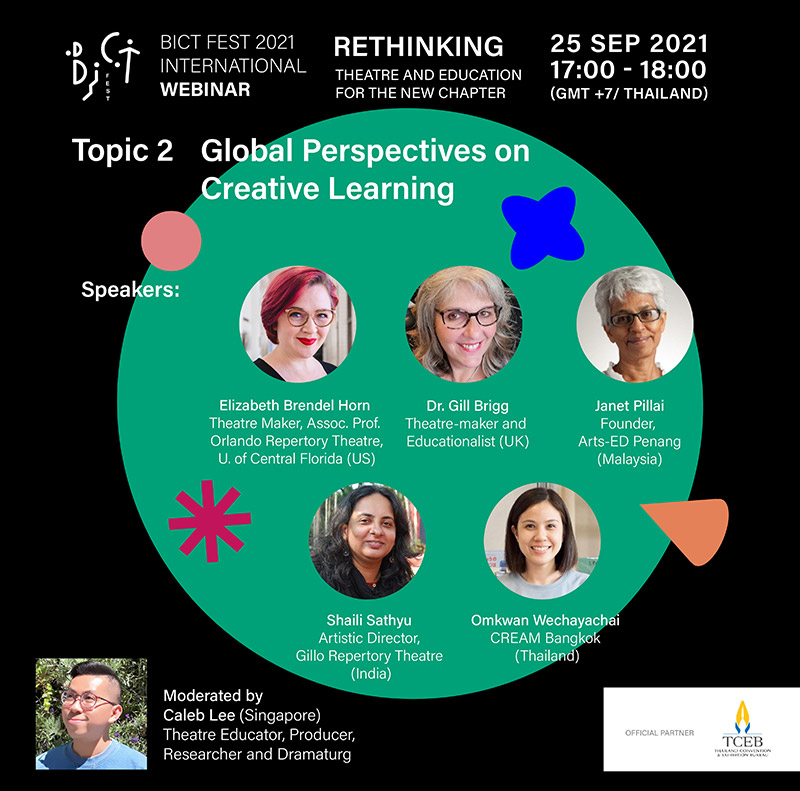
การแพร่กระจายของโรคระบาด ได้ทำให้ความไม่เสมอภาคในการเข้าถึงศิลปะขยายตัวกว้างขึ้น พร้อมๆ กับทำให้การจัดกิจกรรมการละครทั้งในและนอกโรงเรียนเป็นไปได้ยากขึ้นด้วย หัวข้อนี้จึงเป็นการสนทนากันถึงวิธีการทำงานเพื่อให้ศิลปะการละครยังคงมีส่วนช่วยให้เกิดการเรียนรู้อย่างสร้างสรรค์และเป็นประโยชน์ต่อพัฒนาการอย่างรอบด้านของเด็ก ทั้งประเด็นที่ว่าศิลปิน นักสร้างสรรค์และนักการศึกษาจะสร้างสมดุลระหว่างกระบวนการและคุณค่าทางศิลปะกับความต้องการในระบบทุนนิยมอย่างไร? เมื่อไม่สามารถหลีกเลี่ยงการปรับตัวให้เข้ากับดิจิตัลแพลตฟอร์ม ศิลปินควรปรับตัวอย่างไร และมีมุมมองต่อการละครและการเรียนรู้อย่างสร้างสรรค์อย่างไรในโลกยุคใหม่นี้ รวมถึงศึกษาว่าศิลปะการละครจะช่วยให้การเรียนรู้เป็นไปอย่างเท่าเทียมมากขึ้นได้อย่างไร
With theatre provision in and beyond schools being put under increasing pressure with disparities in access to the arts widening amid the pandemic, this panel will discuss the ways in which theatre can continue to contribute to children’s holistic development and creative learning. How do practitioners and educators constructively balance between the demands of capitalist forces and their artistic practices? With the enforced ‘digital turn’ of the pandemic changing the way how art is produced and distributed, where do we see theatre and creative learning in this new chapter? How can theatre offer an equitable space for learning?
หัวข้อที่ 3 การเรียนรู้ผ่านการเล่น: หลักการและวิธีการ
Topic 3 – Learning Through Play: Practices and Principles
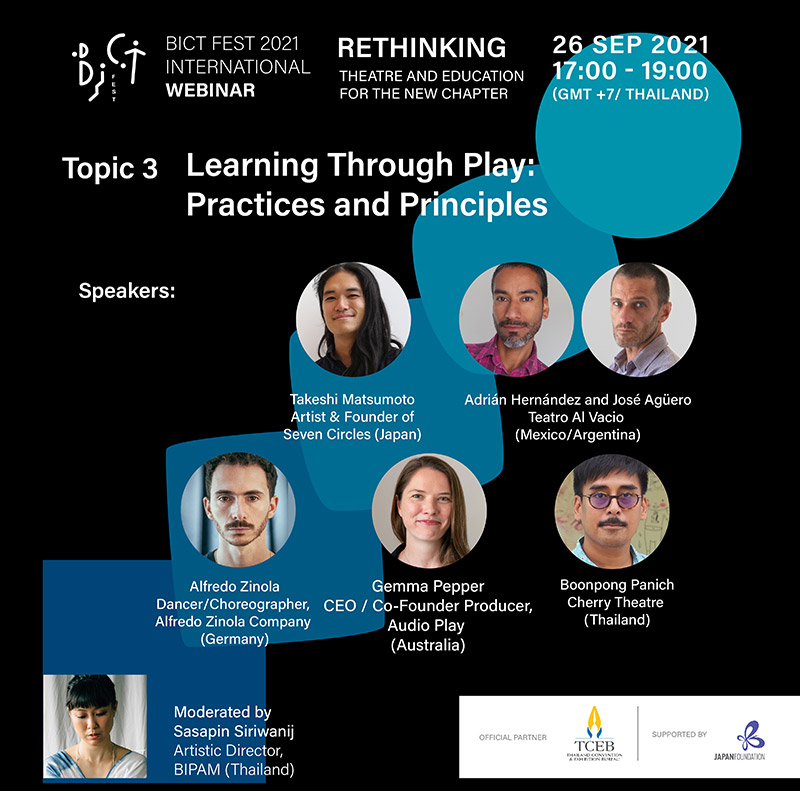
การเล่นถือเป็นหัวใจสำคัญสำหรับการเรียนรู้และการเติบโตของเด็ก เป็นส่วนสำคัญในชีวิตเด็กทุกคนทั้งเรื่องความสนุกสนานของความทรางจำในวัยเด็ก และยังส่งผลต่อพัฒนาการทางด้านสังคม อารมณ์ สติปัญญา และด้านร่างกายของเด็กอีกด้วย แต่สถานการณ์โรคระบาดได้ส่งผลต่อสภาพความเป็นอยู่ รวมถึงวิธีการเข้าสังคม การสื่อสาร และ การเล่นของพวกเขาเป็นอย่างมาก ในหัวข้อนี้ เราจึงเชิญศิลปินมาแบ่งปันและสะท้อนประสบการณ์เกี่ยวกับแรงบันดาลใจ สิ่งที่เป็นแรงผลักดัน และสิ่งที่เป็นอุปสรรคในการทำงาน รวมถึงวิธีการทางศิลปะที่พวกเขาใช้ในการทำงานเพื่อชวนเด็กๆ ให้ร่วมเล่น จินตนาการ และ กระตุ้นความอยากรู้อยากเห็นของเด็กๆ เกี่ยวกับโลกภายนอกที่พวกเขาต้องใช้ชีวิตอยู่ พร้อมทั้งสนทนากันว่าเราจะช่วยส่งเสริมเด็กๆ ผ่านการเล่นได้อย่างไร? ศิลปินกับนักการศึกษาจะสร้างโอกาสในการเล่นอย่างเท่าเทียมอย่างไร? และรูปแบบของการเล่นในยุค “นิว นอร์มอล” นี้ควรเป็นอย่างไร?
Play is central to children’s learning and growth. It is an essential part of every child’s life and is vital for the enjoyment of childhood as well as social, emotional, intellectual and physical development. However, in light of the pandemic lockdown and tightened social-distancing measures, this has affected children’s well-being and the way they socialise, communicate and play. The speakers in this artist-led panel will reflect on their inspiration, motivation and frustration, and discuss how their art practices invite children to play, imagine, and remain curious about the world they live in. How do we continue to empower children through play? How can artists and educators offer equitable opportunities for children to play in times of crisis? What does play and playing in the ‘new normal’ look like?
กิจกรรมพิเศษ/ Special Event
Thai TYA Gathering x Thai Theatre Foundation
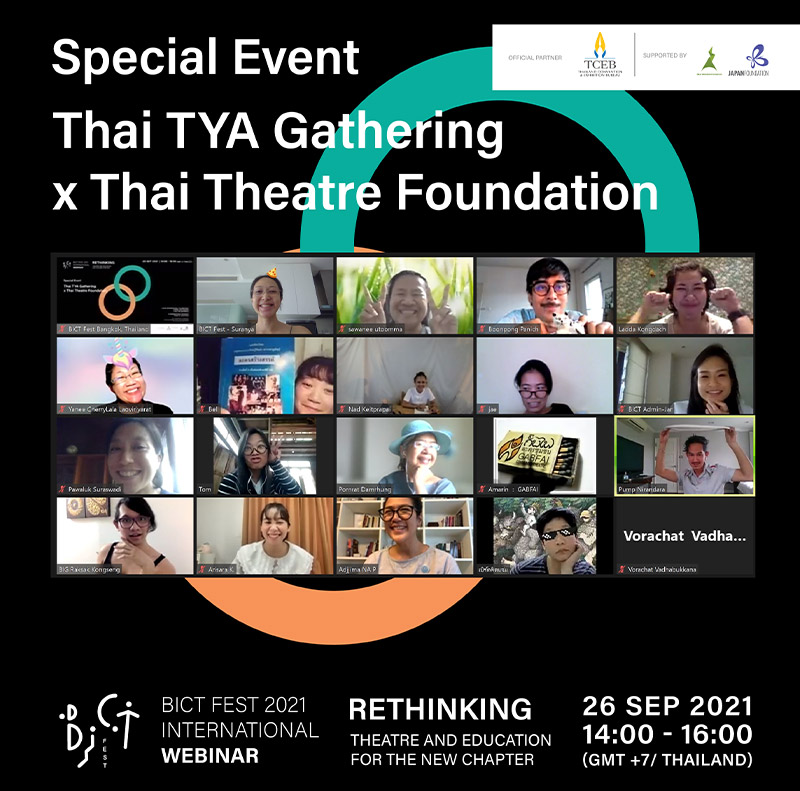
พื้นที่แลกเปลี่ยนเพื่อนักการละครสำหรับเด็กและเยาวชนในประเทศไทย เพื่อสร้างเครือข่าย และพูดคุยกันถึงความเป็นไปได้ต่างๆ ที่จะเกิดขึ้นในอนาคต
BICT Fest ได้ชวนผู้ที่สนใจการทำงานเชิงสร้างสรรค์เพื่อเด็กและเยาวชนร่วมแลกเปลี่ยนในกิจกรรม Thai TYA Gathering การชุมนุมเครือข่ายละครเพื่อเด็กและเยาวชนในประเทศไทย เป็นกิจกรรมต่อเนื่องจากการพูดคุย Intermission Talks เรื่องการละครสำหรับเด็กและเยาวชนในประเทศไทย ที่จัดขึ้นโดยไทยเธียเตอร์ฟาวน์เดชั่น ซึ่งเราได้พบว่ามีประเด็นต่างๆ อีกมากมายที่ได้ถูกหยิบยกขึ้นมาพูดคุย แต่ยังต้องการการถกเถียงอย่างลึกซึ้งยิ่งขึ้น เราจึงได้จัดพื้นที่นี้ขึ้นมาอีกครั้งเพื่อให้เกิดการพูดคุยแลกเปลี่ยน และสร้างเครือข่ายสำหรับพัฒนาวงการการละครเพื่อเด็กและเยาวชน รวมถึงการเรียนรู้เชิงสร้างสรรค์ต่อไปในอนาคต ประกอบด้วย 3 ประเด็นการพูดคุย ได้แก่
1. การพัฒนาของการละครเพื่อเด็กและเยาวชนในประเทศไทย ชวนพูดคุยโดย : อริสรา แก้วม่วง
เราจะสนับสนุนการสร้างผู้ชมและการพัฒนางานในเชิงศิลปะสำหรับงานเพื่อเด็กและเยาวชนอย่างไรและในระดับใด
2. ความเข้าใจในงานละครสำหรับเด็กและเยาวชนในเชิงการสร้างสรรค์งาน การศึกษา และการเปลี่ยนแปลงสังคม ชวนพูดคุยโดย : บุญพงษ์ พานิช (ครูเบิร์ด)
ประเด็นและวิธีการคืออะไร/ เราจะสร้างงานสำหรับเด็กอย่างมีความหมายอย่างไร/ และศิลปินที่ใช้วิธีการต่างกันจะทำงานร่วมกันได้อย่างไรบ้าง
3 คุณค่าเชิงศิลปะของงานละครเพื่อเด็กและเยาวชน ชวนพูดคุยโดย : สินีนาฏ เกษประไพ
มีภาพจำหรือความเข้าใจผิดอะไรหรือไม่/ อะไรคือเส้นแบ่งหรือสิ่งที่ซ้อนกันอยู่ของการเป็นงานสร้างสรรค์ และ วัตถุประสงค์ทางด้านการศึกษาและการใช้ปัญหาเป็นฐานคิด
A special event where Thai theatre for young audiences practitioners and educators were invited to exchange and inspire each other.
This session builds on the robust Theatre for Young Audiences (TYA) discussion during the Intermission Talk by the Thai Theatre Foundation (TTF) where many pertinent issues on education, childhood and creativity were raised, reflecting the passion, heartbeat and commitment of the local TYA community (theatre practitioners, artists, facilitators, educators and others involved in the field). As these conversations needed more time to develop – and still exist vividly in our minds – BICT Fest felt that it was timely and necessary to host another dialogue during this year’s international webinar to allow space for these conversations to grow. The 3 issues that we have picked up for this gathering are;
1. The development of TYA in Thailand facilitated by Arisara Keawmuang
How, and to what extent, can we encourage audience and artistic development?
2. Understanding local TYA practices in artistic creation, education, and for social change facilitated by Boonpong Panich
What are the points and practices? How can we create work for children that is meaningful? How, and in what ways, can artists from different practices work closely together?
3. The aesthetics of TYA facilitated by Sineenadh Keitprapai
Are there preconceptions or misconceptions? What are the overlapping boundaries between artistic
creation and educational and issue based approaches?


